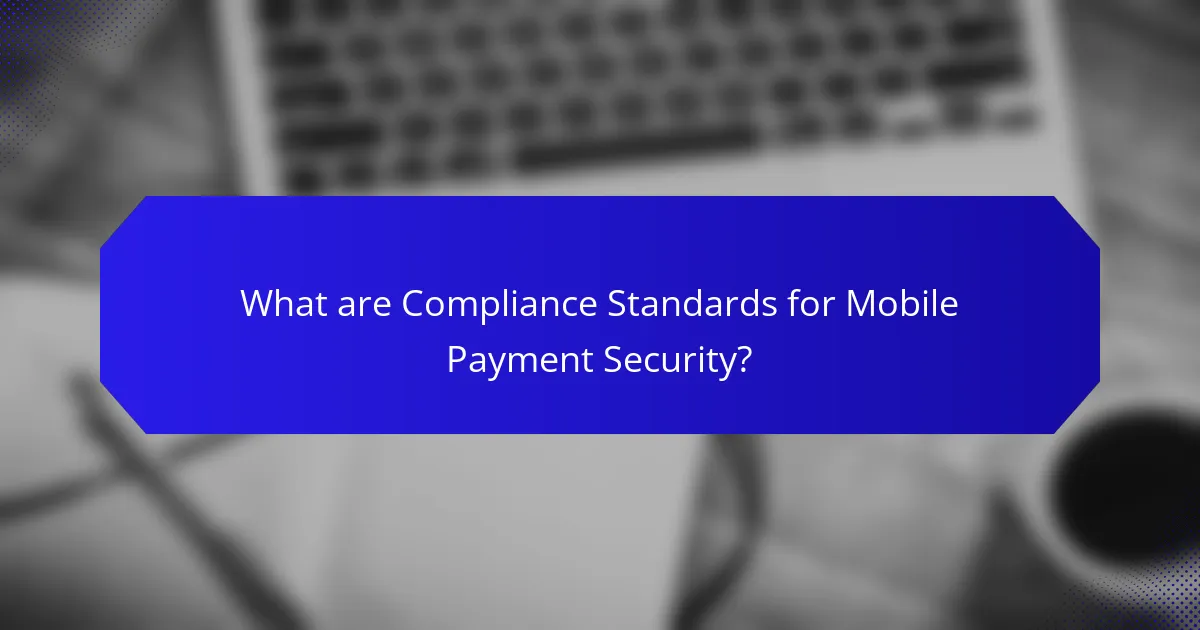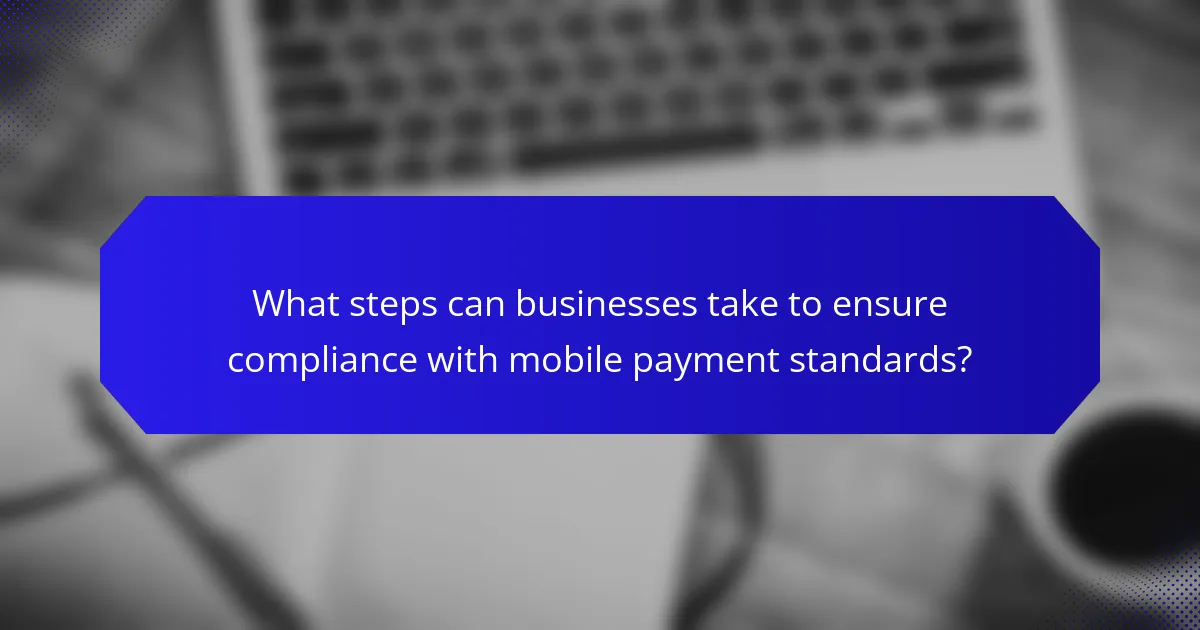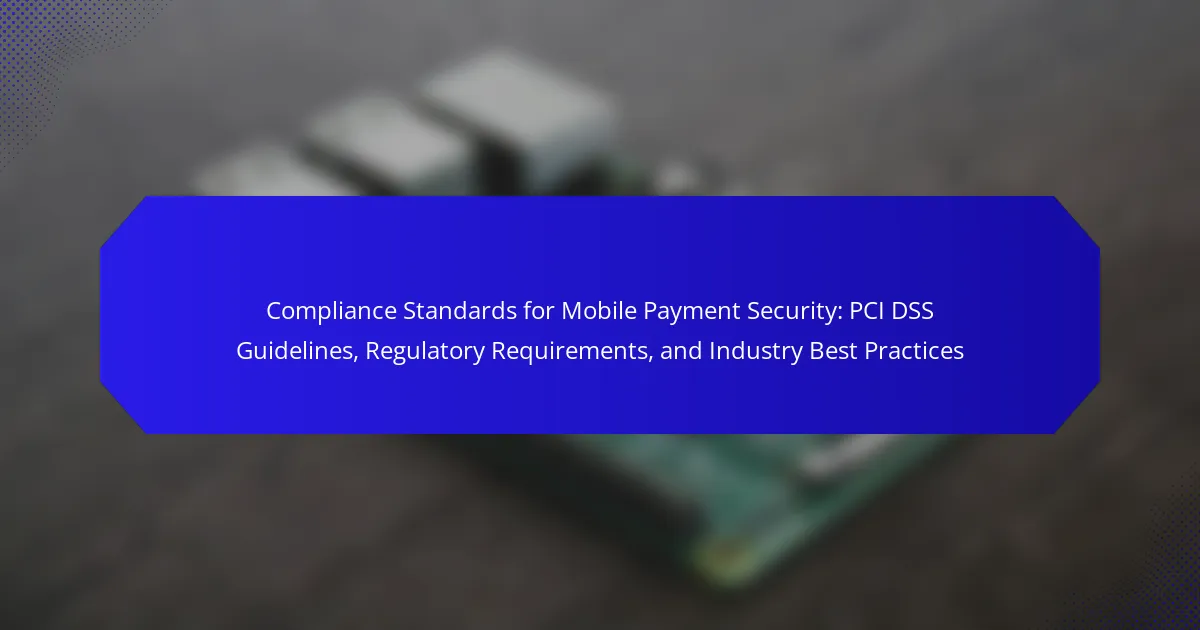Compliance standards for mobile payment security are essential guidelines that ensure safe transactions and protect sensitive cardholder data. The Payment Card Industry Data Security Standard (PCI DSS) serves as a critical framework, mandating security measures such as encryption, access controls, and regular security assessments. Additionally, regulatory requirements like the General Data Protection Regulation (GDPR) influence compliance across different regions. Industry best practices, including two-factor authentication and secure coding, further enhance security by reducing the risk of data breaches and fraud. Businesses can achieve compliance by implementing these standards, conducting regular assessments, training employees, utilizing secure payment gateways, and keeping systems updated.

What are Compliance Standards for Mobile Payment Security?
Compliance standards for mobile payment security include guidelines that ensure safe transactions. The Payment Card Industry Data Security Standard (PCI DSS) is a key framework. It mandates security measures for organizations handling card payments. Compliance requires protecting cardholder data through encryption and access controls. Regular security assessments and vulnerability scans are also necessary. Additionally, regulatory requirements vary by region. For example, the General Data Protection Regulation (GDPR) applies in Europe. Industry best practices include using two-factor authentication and secure coding practices. Adhering to these standards reduces the risk of data breaches and fraud.
Why are Compliance Standards important for mobile payments?
Compliance standards are essential for mobile payments to ensure security and trust. They protect sensitive data during transactions. Compliance with standards like PCI DSS reduces the risk of data breaches. It also helps businesses avoid costly fines and legal issues. Adhering to regulations builds consumer confidence in mobile payment systems. Compliance standards promote industry best practices, leading to improved security measures. According to a 2021 report by Verizon, 81% of data breaches involve weak or stolen passwords. Therefore, compliance standards are crucial for safeguarding both businesses and consumers in mobile payments.
What risks do non-compliance pose to mobile payment systems?
Non-compliance with regulations poses significant risks to mobile payment systems. These risks include financial penalties, which can reach millions of dollars depending on the severity of the violation. Additionally, non-compliance can lead to data breaches, exposing sensitive customer information. Such breaches can result in legal actions from affected users and damage to the brand’s reputation. Furthermore, non-compliance may lead to loss of customer trust, impacting user retention and acquisition. According to the Ponemon Institute, the average cost of a data breach is $3.86 million, highlighting the financial implications of non-compliance. Lastly, regulatory authorities may impose operational restrictions, limiting the ability to conduct business effectively.
How does compliance enhance consumer trust in mobile payments?
Compliance enhances consumer trust in mobile payments by ensuring adherence to established security standards. Compliance with regulations like PCI DSS protects sensitive payment information. It minimizes the risk of data breaches and fraud, which can undermine consumer confidence. Regular audits and assessments demonstrate a commitment to security. This transparency fosters trust among consumers, as they feel their data is protected. Research indicates that 70% of consumers are more likely to use mobile payments from compliant providers. Thus, compliance directly correlates with increased consumer trust in mobile payment systems.
What are the key components of PCI DSS Guidelines?
The key components of PCI DSS Guidelines include six main objectives. These objectives are designed to protect cardholder data. The first objective is to build and maintain a secure network. This includes installing a firewall to protect cardholder data. The second objective is to protect cardholder data. This involves encrypting transmission of cardholder data across open networks. The third objective focuses on maintaining a vulnerability management program. This includes using and regularly updating anti-virus software. The fourth objective is to implement strong access control measures. This requires restricting access to cardholder data on a need-to-know basis. The fifth objective is to regularly monitor and test networks. This involves tracking and monitoring all access to network resources and cardholder data. The sixth objective is to maintain an information security policy. This requires developing, maintaining, and disseminating a security policy that addresses information security for employees and contractors. These components collectively ensure the security of cardholder information and compliance with PCI DSS standards.
What specific requirements are outlined in the PCI DSS?
The PCI DSS outlines specific requirements to protect cardholder data. There are 12 requirements grouped into six categories. These categories include building and maintaining a secure network, protecting cardholder data, maintaining a vulnerability management program, implementing strong access control measures, regularly monitoring and testing networks, and maintaining an information security policy. Each requirement is designed to enhance security and reduce the risk of data breaches. For example, requirements include the installation of firewalls, encryption of cardholder data, and regular security testing. Compliance with these requirements is essential for any organization that processes credit card transactions.
How do these guidelines apply to mobile payment providers?
The guidelines for mobile payment providers focus on ensuring secure transactions and protecting customer data. Mobile payment providers must adhere to PCI DSS guidelines to safeguard payment card information. Compliance with these standards includes encrypting data during transmission and storage. Mobile payment providers are also required to implement strong access control measures. Regular security testing and vulnerability assessments are essential for maintaining compliance. Additionally, providers must educate their users about safe payment practices. By following these guidelines, mobile payment providers can minimize the risk of data breaches. This compliance is critical, as the global mobile payment market is projected to reach $12.06 trillion by 2027, highlighting the need for robust security measures.
What regulatory requirements affect mobile payment security?
Regulatory requirements affecting mobile payment security include the Payment Card Industry Data Security Standard (PCI DSS), the General Data Protection Regulation (GDPR), and the Electronic Fund Transfer Act (EFTA). PCI DSS mandates security measures for organizations handling credit card information. GDPR imposes strict data protection and privacy regulations for personal data of EU citizens. EFTA governs electronic payments and provides consumers with certain rights and protections. Compliance with these regulations ensures secure handling of payment information and consumer data. Failure to comply can result in significant penalties and financial loss for businesses.
Which government regulations must mobile payment systems adhere to?
Mobile payment systems must adhere to various government regulations. These include the Payment Card Industry Data Security Standard (PCI DSS) for transaction security. The Electronic Fund Transfer Act (EFTA) regulates electronic payments and consumer rights. The Gramm-Leach-Bliley Act (GLBA) mandates data privacy and protection practices. Anti-Money Laundering (AML) regulations require reporting suspicious activities. The General Data Protection Regulation (GDPR) applies to user data protection in the EU. Compliance with these regulations ensures the security and privacy of mobile payment transactions.
How do international regulations impact mobile payment compliance?
International regulations significantly impact mobile payment compliance by establishing mandatory standards for security and privacy. These regulations, such as the General Data Protection Regulation (GDPR) in Europe, enforce strict data handling protocols. Compliance with these regulations requires mobile payment providers to implement robust encryption and data protection measures. Failure to comply can result in substantial fines and legal repercussions. Additionally, regulations often necessitate regular audits and compliance checks to ensure adherence. This creates a framework that promotes consumer trust and protects sensitive financial information. Overall, international regulations shape the operational practices of mobile payment systems globally.

How do industry best practices influence mobile payment security?
Industry best practices significantly enhance mobile payment security by establishing standardized protocols. These protocols guide companies in implementing robust security measures. For instance, the Payment Card Industry Data Security Standard (PCI DSS) outlines requirements for securing payment data. Adhering to PCI DSS can reduce the risk of data breaches by up to 80%. Best practices encourage encryption, tokenization, and secure authentication methods. These techniques protect sensitive information during transactions. Regular security assessments and updates are also emphasized. Such practices help organizations stay ahead of emerging threats. Overall, following industry best practices fosters a secure mobile payment ecosystem.
What are the most recognized best practices for mobile payment security?
The most recognized best practices for mobile payment security include the use of strong encryption, regular software updates, and secure authentication methods. Strong encryption protects sensitive data during transmission. Regular software updates address vulnerabilities and enhance security features. Secure authentication methods, such as two-factor authentication, add an extra layer of protection. Additionally, merchants should comply with PCI DSS standards to ensure secure handling of cardholder information. Implementing tokenization can further reduce the risk of data breaches. Regular security audits help identify potential weaknesses in the system. Educating users about phishing attacks and secure payment practices is also essential. These practices collectively strengthen mobile payment security and protect user data.
How can businesses implement these best practices effectively?
Businesses can implement best practices for mobile payment security effectively by adhering to PCI DSS guidelines. They should conduct regular security assessments to identify vulnerabilities. Training employees on security protocols is essential for maintaining compliance. Additionally, businesses must ensure strong encryption for data transmission. Implementing multi-factor authentication adds an extra layer of security. Regularly updating software and systems helps protect against emerging threats. Monitoring transactions for suspicious activity is crucial for early detection of fraud. Following these steps can significantly enhance mobile payment security and compliance.
What role does employee training play in maintaining compliance?
Employee training is essential for maintaining compliance with regulations and standards. It ensures that employees understand their responsibilities regarding compliance. Proper training helps mitigate risks associated with non-compliance. Employees equipped with knowledge are more likely to adhere to policies and procedures. According to a study by the Ponemon Institute, organizations with effective training programs experience fewer data breaches. Regular training updates keep employees informed about changes in regulations. This proactive approach fosters a culture of compliance within the organization. Ultimately, well-trained employees contribute to the overall security of mobile payment systems.
What are the consequences of failing to meet compliance standards?
Failing to meet compliance standards can result in severe penalties. Organizations may face financial fines that can reach millions of dollars. Non-compliance can lead to legal repercussions, including lawsuits from customers or partners. It may also result in loss of business licenses or permits. Additionally, companies risk reputational damage, leading to loss of customer trust. Data breaches are more likely to occur without compliance, exposing sensitive information. This can lead to further regulatory scrutiny and increased oversight. Ultimately, non-compliance can jeopardize an organization’s ability to operate effectively in the market.
What penalties do companies face for non-compliance?
Companies face various penalties for non-compliance with PCI DSS guidelines. These penalties can include substantial fines, which may range from $5,000 to $100,000 per month. Additionally, companies may incur costs related to forensic investigations and remediation efforts. Non-compliance can also lead to increased transaction fees imposed by payment processors. In severe cases, companies may lose their ability to process credit card transactions altogether. According to the PCI Security Standards Council, non-compliance can result in reputational damage and loss of customer trust. These penalties emphasize the importance of adhering to compliance standards in mobile payment security.
How can a compliance failure affect a company’s reputation?
A compliance failure can severely damage a company’s reputation. It can lead to loss of customer trust and confidence. Customers expect businesses to adhere to regulations. When a company fails to comply, it signals negligence. This can result in negative media coverage. Such coverage amplifies public perception of risk. Research indicates that 75% of consumers avoid brands with compliance issues. Additionally, regulatory penalties can further tarnish a company’s image. A tarnished reputation can lead to decreased sales and market share.

What steps can businesses take to ensure compliance with mobile payment standards?
Businesses can ensure compliance with mobile payment standards by implementing several key steps. First, they must adhere to the Payment Card Industry Data Security Standard (PCI DSS). This standard outlines security measures for handling cardholder data.
Next, businesses should conduct regular security assessments. These assessments identify vulnerabilities in the payment systems. They help businesses address any weaknesses proactively.
Additionally, training employees on mobile payment security is crucial. Employees must understand the importance of protecting customer data. Regular training sessions can keep staff updated on best practices.
Businesses should also use secure payment gateways. These gateways encrypt transaction data, reducing the risk of data breaches. Choosing reputable payment processors is essential for maintaining compliance.
Lastly, keeping software and systems updated is vital. Regular updates can patch security vulnerabilities. This practice helps businesses stay compliant with evolving standards.
How can businesses assess their current compliance status?
Businesses can assess their current compliance status by conducting a comprehensive compliance audit. This audit should evaluate adherence to relevant regulations, such as PCI DSS for mobile payment security. Businesses must review their policies, procedures, and controls against these standards. They can utilize self-assessment questionnaires provided by regulatory bodies. Engaging third-party compliance experts can offer an external perspective. Additionally, tracking compliance metrics helps identify gaps. Regular training and updates for staff ensure ongoing awareness. Documenting findings and corrective actions is crucial for maintaining compliance. This systematic approach supports continuous improvement in compliance efforts.
What tools and resources are available for compliance assessment?
Compliance assessment tools and resources include software solutions, frameworks, and guidelines. Tools like compliance management software assist organizations in tracking their adherence to regulations. Resources such as the PCI DSS documentation provide essential guidelines for compliance. Frameworks like NIST Cybersecurity Framework offer structured approaches to assess compliance levels. Additionally, third-party assessment services can conduct audits to evaluate compliance status. Industry-specific standards and benchmarks also serve as valuable resources for assessing compliance. These tools and resources help ensure organizations meet regulatory requirements effectively.
What are practical tips for maintaining ongoing compliance?
Regularly review and update compliance policies to reflect current regulations. Conduct periodic audits to identify gaps in compliance. Train employees on compliance requirements and best practices. Implement robust data protection measures to secure sensitive information. Maintain accurate documentation of compliance efforts and changes. Establish a compliance monitoring system to track adherence to standards. Engage with legal and compliance experts for ongoing guidance. Schedule regular assessments to adapt to evolving regulatory landscapes.
How often should businesses review their compliance practices?
Businesses should review their compliance practices at least annually. Regular reviews ensure adherence to evolving regulations and standards. Compliance requirements can change frequently, necessitating updates to practices. Additionally, businesses should conduct reviews whenever there are significant changes in operations or technology. This proactive approach helps mitigate risks and maintain security. The PCI DSS guidelines recommend regular assessments to ensure ongoing compliance. Regular reviews also help identify potential vulnerabilities in the system.
What common pitfalls should businesses avoid in compliance efforts?
Businesses should avoid insufficient training for employees in compliance efforts. Without proper training, employees may inadvertently violate regulations. This can lead to costly fines and reputational damage. Another common pitfall is neglecting regular audits. Regular audits help identify compliance gaps and ensure adherence to standards. Failing to document compliance processes is also a critical mistake. Documentation provides evidence of compliance during inspections. Additionally, businesses should not overlook changes in regulations. Compliance requirements can evolve, and staying informed is essential. Lastly, inadequate risk assessments can result in unaddressed vulnerabilities. Conducting thorough assessments helps mitigate potential compliance risks.
Compliance standards for mobile payment security encompass guidelines that ensure safe transactions, primarily focusing on the Payment Card Industry Data Security Standard (PCI DSS). This article outlines the importance of these standards in protecting sensitive data, the risks associated with non-compliance, and how adherence enhances consumer trust. It also details the key components of PCI DSS, regulatory requirements impacting mobile payments, and industry best practices that strengthen security measures. Furthermore, the article discusses practical steps businesses can take to maintain compliance and the potential consequences of failing to meet these standards.
